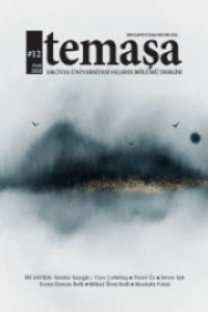Özgürlüğün Boşluğu: Jacques Rancière’in Siyaset Anlayışının Tocqueville Üzerinden Bir Analizi
Bu makalede, önce Rancière’in siyasi düşüncesine ilişkin anlatımı sunulacaktır. Bu bağlamda, Ranciere’in anlaşmazlık yoluyla siyaset tanımlamasının, siyasetin paradoksunu rasyonel olarak ortaya koymasından dolayı orijinal bir proje olduğu savunulacaktır. Rancière’in polis düzeninde siyasetin gerçekleşmesinin imkânsızlığına ilişkin genel bir varsayımı olduğuna dair genel bir eleştiri vardır. Bu makalede, ikinci olarak, bu eleştiriye karşı çıkılacak ve Rancière’in polis ve eşitlikçi düzenleri bireysel kimlik ve özneleştirme açısından statik ve tekil olarak tanımlamadığı iddia edilecektir. Üçüncü olarak, Rancière’in siyaset kuramında eşitlik ve özgürlük kavramları arasındaki ilişkiye dair anlayışı açısından çok önemli bir sorun olduğu gösterilmeye çalışılacaktır. Eşitlik ve özgürlük arasındaki bağlantının Rancière’in bizim düşünmemizi istediği kadar güçlü olmayabileceğini göstermek için Tocqueville’in demokratik eşitlik eleştirisinden referans verilerek eşitliğin siyaset üzerinde olumsuz etkileri olabileceği iddia edilecektir. Son olarak, Rancière’in ele aldığı siyasi olayların analizleri vasıtasıyla, Rancière’in özgürleştirici politikasının belirli bir tür insan doğası varsayımını gerektirdiği gösterilecektir. Bu nedenle, Rancière’in siyaset teorisinin merkezindeki ölçülemez yanlışın tezahürünü anlamak için üçüncü tarafların ve bilginin ve değişimin üreticisi olarak siyasetin rolü ve önemi dikkate alınmalıdır.
Emptiness of Freedom: An Analysis of Jacques Rancière’s Understanding of Politics through Tocqueville
In this article, first, I introduce my account of Ranciere’s political thought. I argue that Ranciere’s description of politics through disagreement is a novel project due to its revelation of the paradox of politics as rational. Second, there is a general assumption about Rancière’s dismissal of any kind of politics within the police order. I oppose this criticism because Rancière does not define police and egalitarian orders as static and individual identity and subjectification as singular. Third, I show that there is a crucial problem in Rancière’s theory in terms of his understanding of the relationship between equality and freedom. I argue that the connection between equality and freedom may not be that strong as Rancière wants us to think and that the democratic ideal of equality may have adverse effects on politics by introducing Tocqueville’s criticism of democratic equality. Finally, by an analysis of political events presented in Disagreement, I argue that Rancière’s emancipatory politics demands a supposition of certain kind of human nature. Hence, the role of politics as the producer of knowledge and change, and the importance of third parties should be taken account for the manifestation of incommensurable wrong for Rancière’s theory of politics to work.
___
- Brant, Daniel. “Distribution of the Sensible” in Understanding Rancière, Understanding Modernism, Editör: Bray, Patrick M., 235-239. USA: Bloomsbury Publishing, 2017.
- Deranty, Jean-Philippe. “Jacques Rancière and Contemporary Political Ontology,” Theory and Event 6, sayı: 4 (2003).
- Dillon, Michael. “A Passion for the (Im)possible Jacques Rancière, Equality, Pedagogy and the Messianic,” European Journal of Political Theory 4, sayı: 4 (2005): 429-452.
- Hewlett, Nick. Badiou, Balibar, Rancière: Rethinking Emancipation. New York: Continuum International Publishing Group, 2007.
- McClure, Kristie M. “Disconnections, Connections, and Questions: Reflections on Jacques Rancière’s ‘Ten Theses on Politics,’” Theory and Event 6, sayı: 4 (2003).
- Rancière, Jacques. On the Shores of Politics. London: Verso, 1992,1995. _________ “Ten theses of Politics,” Theory and Event 5, sayı: 3 (2001). _________ Disagreement. Minneapolis: U. of Minnesota Press, 1995, 1999.
- Tocqueville, Alexis de. Democracy in America. Chicago: University of Chicago Press, 2000.
- Trott, Adriel M. “Rancière and Aristotle: Parapolitics, Party Politics, and the Institution of Perpetual Politics,” The Journal of Speculative Philosophy 26, sayı: 4 (2012): 628-632.
- ISSN: 2148-371X
- Yayın Aralığı: 2
- Başlangıç: 2014
- Yayıncı: Prof. Dr. Arslan Topakkaya / Erciyes Üniversitesi Felsefe Bölümü
